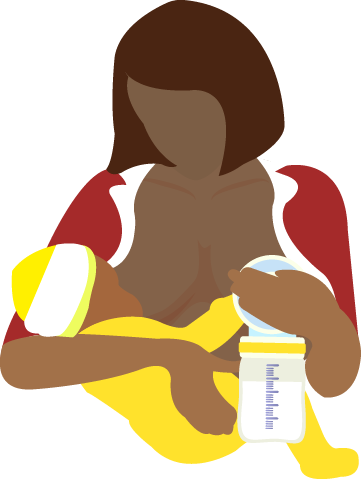
Caring for Your 2-Month-Old
FAMILY ADJUSTMENT
It is very common for parents to feel exhausted at this stage. If you feel overwhelmed or overly sad, ask for help or call your pediatrician’s office.
Try to rest while the baby is sleeping. Accept help when it is offered.
It is normal for older siblings to feel displaced, and maybe even angry. Try to keep older siblings involved in a way that is helpful to you and lets them feel included in the attention the baby is receiving.
Find ways to spend time alone with each child and with your partner.
If you are returning to work outside the home, have trustworthy child care in place. If you are nursing, start to stockpile expressed breast milk in your freezer.
NUTRITION
Exclusively breast-fed infants require supplemental vitamin D (400 IU/day), which is available at most drug stores/supermarkets.
Bottles should be held, not propped, for babies.
Infants need to nurse/feed every two to three hours.
Water, other drinks and solid foods should not be given at this age, unless advised by your pediatrician.
ELIMINATION
Regular, easy-to-pass, soft yellow stools at least once daily are normal in this age group.
If you have concerns about the frequency or consistency of the baby’s stool, talk with your baby’s doctor.
BABY CARE
Bathe your infant in a small tub/bathinette using warm (not hot) water and gentle soap, as frequently as every day. Never leave your baby alone during bath time.
When the child is fussy, a change of scenery can be helpful. If the weather cooperates, try going for a walk.
Protect your baby’s skin from sun exposure. If possible, infants should be kept out of direct sunlight. Use a hat to shield babies from the sun. Use a sunscreen with SPF 30 or higher that offers UVA and UVB protection.
GROWTH AND DEVELOPMENT
Most 2-month-olds responsively smile and coo, and love social interaction.
Babies this age will make eye contact with you, and their eyes will follow you as you walk around the room. They may occasionally cross their eyes.
Singing and cuddling with your baby will build trust and closeness in the relationship. Reading to your infant will promote language skills.
“Tummy time” helps your infant develop strong muscles in the neck and back that will eventually allow the baby to sit up. It is encouraged while the baby is awake and alert. Most 2-month-olds keep their heads up when lying on their bellies.
Routines begin to emerge regarding sleeping and feeding schedules.
SAFETY
Always place your baby on his or her back to sleep to reduce the chance of sudden infant death syndrome (SIDS). Co-sleeping, sleeping with your child, increases the risk for SIDS. Infants should sleep in a crib with a firm mattress covered by a fitted sheet. Keep bumper pads, pillows, blankets, loose bedding and soft objects, like stuffed toys, out of the crib.
Some babies can roll at this age. Do not leave your baby unattended in a tub or on any surface off the ground, such as sofas, countertops or changing tables.
Supervise pets and siblings when they are around the baby.
Keep the living environment (including the car) smoke-free, and keep small items (choking hazards) and hot liquids (burn risks) away from the baby.
Never shake your baby.
Make sure your home has working smoke and carbon monoxide detectors.
All babies this age must ride in a rear-facing five-point harness car seat in the back seat of the vehicle.
This document contains general parenting information based on American Academy of Pediatrics recommendations and is not meant to replace the expert advice of your pediatrician.




